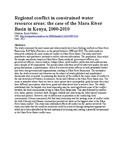| dc.description.abstract | The study examined the root causes and what actually have been fuelling conflicts in Mara River Basin area, Rift Valley Province, in the period between 2000 and 2010. The study made an attempt to establish the main causes of conflict in Mara River Basin. The study used both quantitative and qualitative methods to collect relevant information. The population, from which the sample was drawn, based on Mara River Basin residents, government officers, non government officers, church leaders, village elders, youth leaders, politicians and academicians and a sample of 40 respondents. The primary data collection involved interview guides, focused group discussions, a questionnaire, with a few selected senior officers in both parastastal bodies and water non governmental organizations, residing in Mara River Basin area.
The secondary data, the study reviewed vast literature on the subject of study published and unpublished documents were reviewed. In analyzing the theories of the conflicts the major cause of conflict is the mal-structures of Politics, Economics, Social and Cultural in the Mara River Basin area. The cause is manifest where there are two or more parties have incompatible goals because they may have different perceptions, objectives, goals and ideas about how to achieve them. The study established that, the dispute over land ownership was the most significant cause of the conflict between the local communities living in Mara River Basin area. This was followed by conflict over water, pasture, livestock theft, drought, wildlife and least being the tribal hatred, business rivalry and politics. However, due to differences in priorities in the conflicting local communities, Kikuyu community felt that land ownership was the leading cause of conflict while the both Kalenjin and Maasai communities pointed out water as the biggest issue in the Mara River basin conflict. The study also established effects of conflict on the parties involved. The study concludes that the conflicts resolution could be achieved through integrated approaches which have been identified as the best instrument in brining and creating a peaceful environment in the Mara River Basin conflict area. | en_US |

